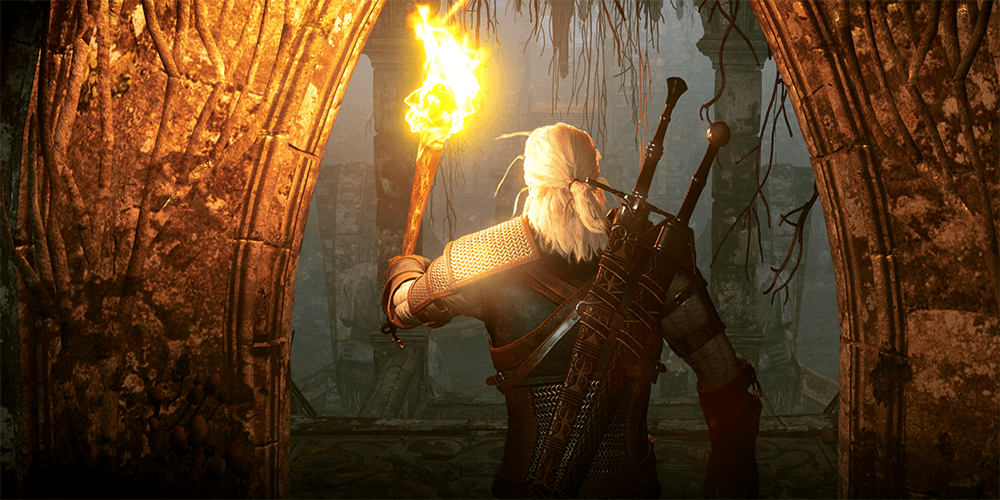About a week and a half ago I finally splurged a little bit to buy a new GPU, a Nvidia GTX 1080; this is one of the most powerful cards on the market at the moment, and should last me a good couple years. I end up upgrading my PC in giant spurtsin about the same time frame, as the future-proofing tends to work out for the best.
I’d been saving playing CD Projekt Red’s The Witcher 3: The Wild Hunt until I’d upgraded, because it felt unsatisfying at medium graphics settings and a choppy framerate. It was definitely worth the wait: seeing the game “as it was meant to be played” as a locked 60 frames-per-second is actually one of the highlights of my recent gaming career.
What I wanted to write about today, though, is The Witcher 3‘s place in the current gaming environment. For me, it felt refreshing to play because it seemed like a healthy balance between the extremes of open-world gameplay and plot-focused narrative experiences.
It’s hard to articulate, but what I’ve desired to play in the last little while is a little bit of both: I want to be able to explore a setting without feeling hamstrung or rushed along a plot, but I also don’t want to feel like I’m a guiding force that’s helping someone I don’t care about go through events I’m not invested in.
It’s kind of like when you’re improvising a recipe, as adding too much of one spice ruins the taste. Sometimes a game gives me too much freedom, so I feel overwhelmed by the choice. It also means that your character likely has little in the way of personality, as you need a blank slate to project yourself onto. Having too much specificity sometimes keeps you from getting attached to your character, or hinges on you loving the game type. Sometimes you need to have little breaks of gameplay where you can fart around and approach things at your own pace.
Witcher 3 hits a pleasant spot for me where both main and sidequests have a lovely amount of development to them. Even one-off characters seem to have a depth and real motivation behind them, which is usually where other games falter.
There’s also a great amount of things to be able to stall out the main story: treasure hunts, explorations, spontaneous side-quests given by peasants on the side of the road. I’ve also never been quite so enthralled by a minigame as I have for Gwent, the deck-building game that urges you to collect the whole set of cards to crush your enemies. Sometimes I spend hours just hunting down optimal drops and trying to find new people to play cards with; this elongates the enjoyment I get out of the game.
When it comes to Geralt, the main character, I find that he also hits that sweet-spot. He’s not too much of a blank slate to feel like he had no purpose, nor does he railroad me into acting in a way that I feel is out of my hands. Sure, he’s a character in his own regard, but I feel able to play a role (wa-hey, it’s a role-playing game) while still injecting personal flair into the way he reacts to and participates in the game’s events.
In the context of the game, Witchers are neither “the chosen ones” nor are they particularly liked by society. Having this position allows the writers to avoid the classic problems of making your character be all-powerful but meaningless. A lot of the criticisms of Skyrim were based around having a character who was all-important for the destiny of the world, then having his actions not actually change much besides a few off-hand comments by NPCs. You were told your actions were crazy-important, but they never felt that way because the game didn’t keep up the level of… praise, I guess?
I feel a greater freedom in Witcher despite not being able to create my own character because Geralt has enough agency that enables his actions to truly matter. With blank-slate characters, you lose out on this because the game cannot take into account every possibility. It’s kind of like Shephard from Mass Effect, but a tiny bit more weighted on the defined side because Geralt has background in books and other works that the player did not generate.
Because we have no control over that, it’s easier to not care about what we can’t influence and focus on what we can. The game gives us just the right amount of agency while providing enough context to make choices easier. We know Geralt can be honorable, lecherous, selfless and moral, but there’s not a huge amount of punishment for deviating from that: because all roads seem super-developed, you never feel like you’re either Satan or Jesus. Thankfully, there’s shades of grey there, which makes for a nuanced story.
I’m still only about 15 hours into The Witcher 3, completing a bunch of contracts and side-quests without worrying about the main plot for the time being. I’m content with this – more content than I thought I’d be in a dark fantasy game. The world has pulled me in despite a prevailing bleak feeling, which I think is a testament to the care and attention to detail the developers have put into it.


Leave a Reply